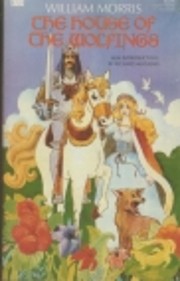

Auf ein Miniaturbild klicken, um zu Google Books zu gelangen.
|
Lädt ... A Tale of the House of the Wolfings and All the Kindreds of the Mark Written in Prose and in Verse (1889)von William Morris
 Keine Keine aktuelle Diskussion zu diesem Buch.   ) )William Morris discovered the most tedious way to tell a story, and he demonstrated his discovery in "A Tale of the House of the Wolfings." I find it hard to believe that he was once offered the office of Poet Laureate of Great Britain and Ireland, upon the death of Lord Tennyson, given how poor the meter and rhyme of his verse in this book is — perhaps the council which presented it to him did so in jest. I applaud Morris for turning it down on the pretense of political differences rather than merit. That said, I still give this book 3 stars (perhaps beyond my better judgment), because if one can get past Morris's absurd archaicism and defective balladry, the story is actually fairly engaging. Perhaps this supports C.S. Lewis's argument in [b:An Experiment in Criticism|80007|An Experiment in Criticism (Canto)|C.S. Lewis|https://d.gr-assets.com/books/1347790855s/80007.jpg|77261] that some stories are universal, regardless of their form. Ya know how documents, museum exhibits, and nonfiction books occasionally frame their expository information in the form of narratives? For instance, a museum exhibit featuring cavemen might trace the life of a child through sequential displays, or a documentary might name an animal and follow it over the course of ninety minutes. In each case, the purpose of the narrative isn't really to tell a good story for story's sake, but to provide a framework in which the audience can follow along, making the factual expository information more palatable. That's pretty much how I felt while reading The House of the Wolfings. William Morris's agenda seems to be to explore the world and lifestyle of ancient Teutonic peoples, with characterization and plot coming second to that. There's nothing wrong with it, and I anticipate reading it again at some point in the future. The light touches of fantasy, such as the dwarf-forged hauberk, were perhaps the most interesting of Morris's flourishes. But essentially this is a novel written for another age, the nineteenth century, when people had fewer resources at their hands to learn about the pre-Westernized word of Northern Europe. In modern times, I don't see much of a purpose for it. keine Rezensionen | Rezension hinzufügen
Gehört zu Verlagsreihen
Classic Literature.
Fantasy.
Fiction.
HTML: Jack-of-all-trades William Morris lived a fascinating life: in between his time designing furniture and textiles, he penned a series of ethereal fantasy epics that would prove to be extremely influential. Though not exactly fantasy, this poetic account of ancient Germanic tribes' efforts to hold back the invading Roman hordes is steeped in the same sense of mythos as Morris' more fantastic tales. .Keine Bibliotheksbeschreibungen gefunden. |
Aktuelle DiskussionenKeineBeliebte Umschlagbilder
 Google Books — Lädt ... Google Books — Lädt ...GenresMelvil Decimal System (DDC)823.8Literature English English fiction Victorian period 1837-1900Klassifikation der Library of Congress [LCC] (USA)BewertungDurchschnitt: (3.68) (3.68)
|
||||||||||||||||||||||||||||||||||||||||||||||||||||||||||||||||||||||||||||||||||||||||||||||||||||||||||||||||||||||||||